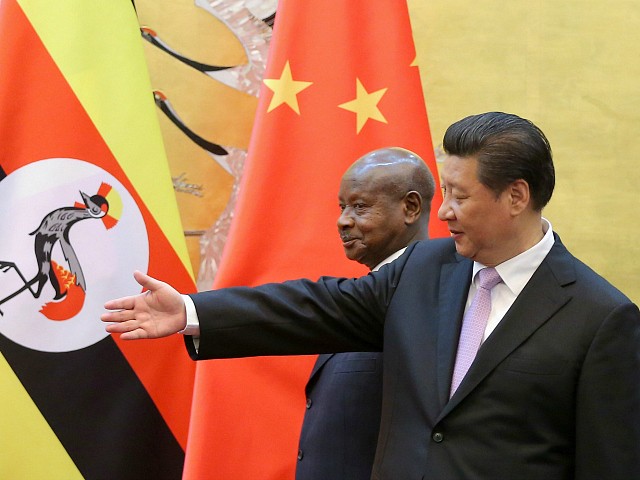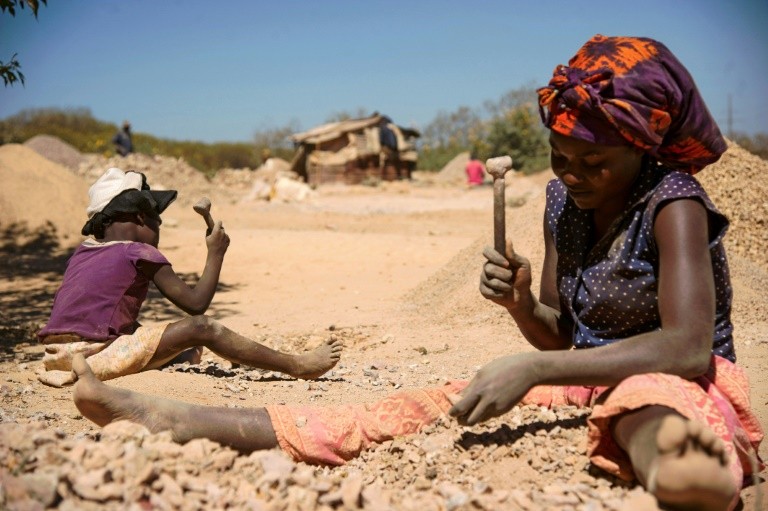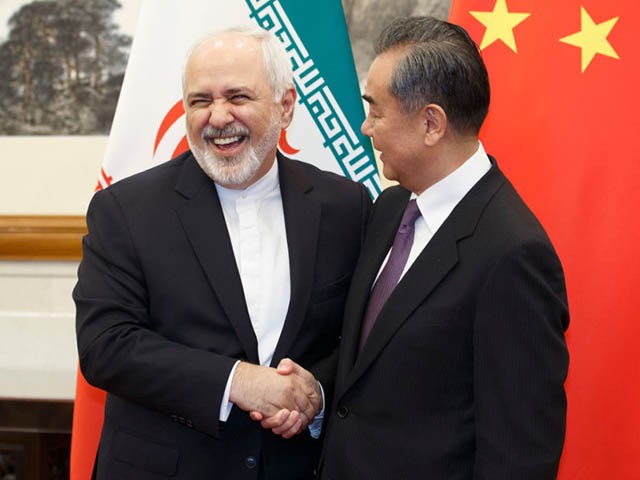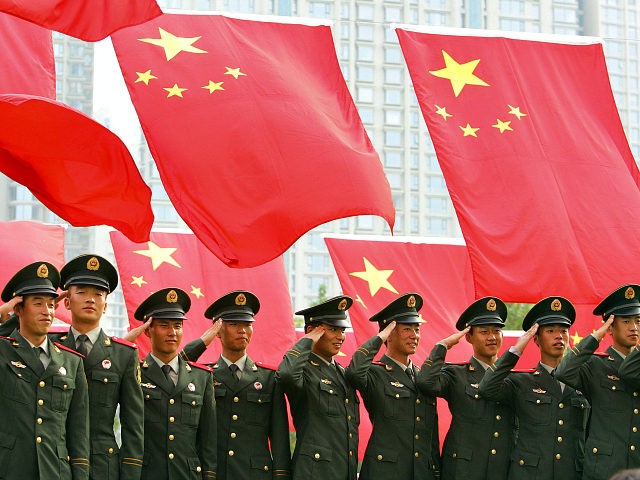The Chinese government is racking up favors from Third World leaders by intervening in conflict zones to offer economic support and security assistance, buying itself positions everywhere from Africa to the Middle East.
The Kampala Independent reported on Sunday that “renowned Chinese military contractors are working with the Uganda Peoples Defense Forces (UPDF)” and the Democratic Republic of Congo (DRC) against the Allied Democratic Forces (ADF), a Ugandan Islamist group that operates out of the Congo.
Ugandan troops launched an incursion into the DRC, with the blessing of the Congolese government, in early December to fight the ADF, which claims to be an affiliate of the Islamic State. The incursion began with airstrikes but soon Ugandan ground troops marched into DRC territory in pursuit of the ADF militants.
According to the Independent, at least two major Chinese military contractors quietly supplied Uganda’s forces: China North Industries Corporation, also known as Norinco, and Poly Technologies, Inc. Norinco is one of China’s biggest arms manufacturers, and a major supplier to the Chinese People’s Liberation Army (PLA).

Ugandan President Yoweri Kaguta Museveni and Chinese President Xi Jinping attend a signing ceremony in the Great Hall of the People on March 31, 2015, in Beijing, China. (Photo by Feng Li – Pool/Getty Images)
The Independent said Uganda purchased armored fighting vehicles from Norinco, including a new model China has only recently begun supplying to foreign clients, while Poly Technologies supplied mine-resistant personnel carriers. The Chinese firm also sells weapons, communications equipment, marine equipment, and ground support for military aircraft that Uganda might be interested in.
The Ugandan government made a public spectacle of its interest in Chinese weapons this year, but then denied it had actually purchased equipment from China when the Independent asked. The report suggested Lt. Gen. Muhoozi Kainerugaba, son of sitting President Yoweri Museveni and an officer with close ties to Chinese interests, was promoted to chief of the UPDF to “cement the relationship” between China and the Ugandan military.
“The highly billed deal between Uganda and the China-based Poly Technologies may rattle some alliances. The U.S., a longstanding ally of Uganda, may not take too well to the arrangement between UPDF and the arms manufacturer if the company’s past transactions are anything to go by,” the Independent ventured.
A spokesperson from the U.S. Embassy declined to comment when the Independent asked how Washington felt about Uganda spending millions on Chinese military equipment while simultaneously receiving defense assistance from the United States.
The Ugandan paper noted China is developing substantial business interests in the African nation, prominently including a pair of cobalt mines purchased from American companies in 2016 and 2020. A Chinese security contractor was brought in to handle security at the mines.

A child and a woman break rocks extracted from a cobalt mine at a copper quarry and cobalt pit in Lubumbashi on May 23, 2016. (Photo by JUNIOR KANNAH/AFP via Getty Images)
Last Wednesday, China offered to send “criminal investigation experts” to Nigeria, which has been fighting several insurgent movements.
“China’s central government is really concerned about the security situation in Nigeria and also Chinese nationals in Nigeria, so now the central government made the decision to send a high-level delegation from the criminal investigation experts with real experience,” explained China’s ambassador to Nigeria, Cui Jianchun.
The South China Morning Post (SCMP) noted China “has been offering military and security training to African countries for decades,” and those offers have increased as China spreads its influence through the Belt and Road infrastructure initiative (BRI), which gives the Chinese a pretext to deploy security forces in developing nations for the protection of Chinese investments, construction, and personnel.
The SCMP quoted a report from the Institute for the Study of Civil Society in London that warned China includes “ideological education” in its military training programs for foreign clients, along with propaganda to “promote its model of governance.” Some notorious dictators have graduated from Chinese military-ideological training programs, including Zimbabwe’s Robert Mugabe.
“The strengthening of PLA contacts with military elites and [Chinese Communist Party] contacts with local political elites can result in a sympathetic elite power network in each country who might support Beijing’s preferences over those of Western countries,” added security analyst Timothy Heath of the U.S.-based Rand Corporation.
Malcolm Davis of the Australian Strategic Policy Institute (ASPI) said China’s provision of military support to African nations “expands its influence and weakens regional support for the U.S.”
Another SCMP piece on Saturday noted China signed 15 contracts with the Iraqi government last week to build over a thousand schools. The deals were signed barely two weeks after the United States formally concluded its combat mission in Iraq, 18 years after the invasion that toppled dictator Saddam Hussein.
The SCMP reported Iraq is now a major destination for Chinese investors, especially in the oil industry, while Chinese companies are bidding on contracts to build power, water, and transportation infrastructure.
China is also currying favor from Iraq’s neighbor and longtime rival Iran by providing political support for Tehran during nuclear negotiations, although there have lately been some signs of Chinese exasperation with Iran’s intransigent position and belligerent statements.
Chinese independent refineries, commonly known as “teapots,” dramatically increased their purchases of Iranian oil this winter.
Although a survey of developing nations by Aiddata last summer claimed the United States and its G7 partners still have a “comfortable lead” over China in Third World influence, an op-ed at Nikkei Asia Review (NAR) in early December argued the Chinese are more aggressively using their growing influence to “export authoritarianism” and bring the political elite of developing nations into ideological alignment with Beijing.
“From conducting webinars for Congolese government officials on learning from China’s modernization experience to building an ideological school for Zimbabwe’s ruling party, the CCP [Chinese Communist Party] is cultivating support in the developing world for China’s illiberal Party-state model,” warned assistant professor Benjamin R. Young of the Wilder School of Government and Public Affairs at Virginia Commonwealth University.

Chinese Foreign Minister Wang Yi meets Iranian Foreign Minister Mohammad Javad Zarif at Diaoyutai State Guesthouse on May 17, 2019, in Beijing, China. (Photo by Thomas Peter-Pool/Getty Images)
“While Beijing promises foreign governments that its system of socialism with Chinese characteristics is solely meant for the Chinese nation, the CCP is actively disseminating its ideological values of absolute loyalty and Party-building discipline to political parties in developing nations,” Young wrote, citing the example of Zimbabwe’s ruling ZANU-PF party sending high-ranking officials to train at a Chinese Communist “ideological school.”
The Chinese Communist Party no longer has to ferry African politicians to China to receive ideological training, as Young noted the CCP opened a “leadership school” in Tanzania three years ago to train ZANU-PF and several other leftist African parties, and in the age of the coronavirus, Communist training is provided to Third World leaders online.
“While Western democratic governments may scoff at the idea of Chinese-style authoritarianism as an appealing model of modernization, ruling parties in developing nations increasingly look at the Chinese Party-state model as the best way to rapidly achieve economic growth and limit political instability,” Young noted.

COMMENTS
Please let us know if you're having issues with commenting.